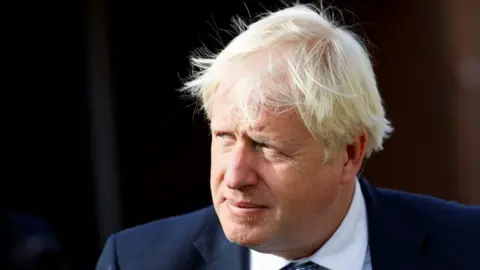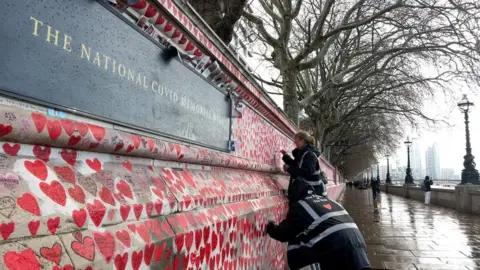Boris Johnson to bypass government on Covid WhatsApps
 PA Media
PA MediaBoris Johnson has said he is giving unredacted WhatsApp messages dating back to May 2021 directly to the Covid inquiry, bypassing the government which has refused to hand them over.
The Cabinet Office has launched a legal challenge to the inquiry's demand for texts from the former PM and officials.
It argues that many of the messages are irrelevant to the investigation.
However, the head of the inquiry, Baroness Hallett, has said it's her job to decide what is and is not relevant.
In a letter to Baroness Hallett, Mr Johnson said that he understood why the government was taking legal action, but that he was "perfectly content" to release messages he had already sent to the Cabinet Office.
Mr Johnson added he would like to send messages pre-dating April 2021, but that he had been told he could no longer access his phone from that period "safely".
Security concerns were raised over the phone, after it emerged the number had been freely available on the internet for 15 years.
The messages received before this date would be likely to cover discussions about the coronavirus lockdowns implemented in 2020.
Mr Johnson said he wanted to "test" the advice received from the security services and had asked the Cabinet Office for assistance in turning his old phone on securely.
He added he no longer had access to his contemporaneous notebooks as he had handed these to the Cabinet Office.
"I have asked that the Cabinet Office pass these to you. If the government chooses not to do so, I will ask for these to be returned to my office so that I can provide them to you directly."
Speaking to BBC Radio 4's World At One programme, cyber-security expert Prof Alan Woodward said the risk of turning on Mr Johnson's old phone was "minimal", adding: "It is perfectly possible to do that without exposing it to the potential threat."
Earlier this week, the inquiry told the government to submit messages sent between Mr Johnson and 40 other ministers and officials during the pandemic by 16:00 BST on Thursday.
Mr Johnson said he was "more than happy" to give the unredacted material to the inquiry.
The Cabinet Office - which supports the prime minister in running the government - also holds communications between ministers and civil servants which do not involve Mr Johnson.
On Thursday, it missed the deadline and said it would "with regret" be launching a judicial review of the demand, but promised to "continue to co-operate fully with the inquiry".
Defending its decision not to hand over certain messages, the Cabinet Office argued that many of the communications were "unambiguously irrelevant", and that to submit them to the inquiry would compromise ministers' privacy and hamper future decision-making.
"It represents an unwarranted intrusion into other aspects of the work of government. It also represents an intrusion into their legitimate expectations of privacy and protection of their personal information," the Cabinet Office said, in a letter to the inquiry.

Speaking to the BBC One's Question Time on Thursday, science minister George Freeman said he thought the "courts will probably take the view" that Baroness Hallett was entitled to decide "what evidence she deems relevant".
But he added "people's privacy is really important" and that the question of how private correspondence should be handled was a "point worth testing".
"I would like to see a situation where the inquiry says: 'Listen, we will wholly respect the privacy of anything that's not related to Covid. We will redact it'," he said.
Labour's deputy leader, Angela Rayner, described the government's legal action as a "desperate attempt to withhold evidence". The Liberal Democrats called it a "kick in the teeth for bereaved families".
Lord Barwell, who worked as chief of staff to former Prime Minister Theresa May, told the BBC Radio 4's Today programme he thought the government was making a "bad mistake".
He added: "We're having the inquiry to give people confidence we're getting to the truth. And if the government is controlling what the inquiry can and can't see, then people are not going to get confidence in the outcome."
